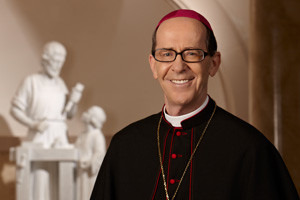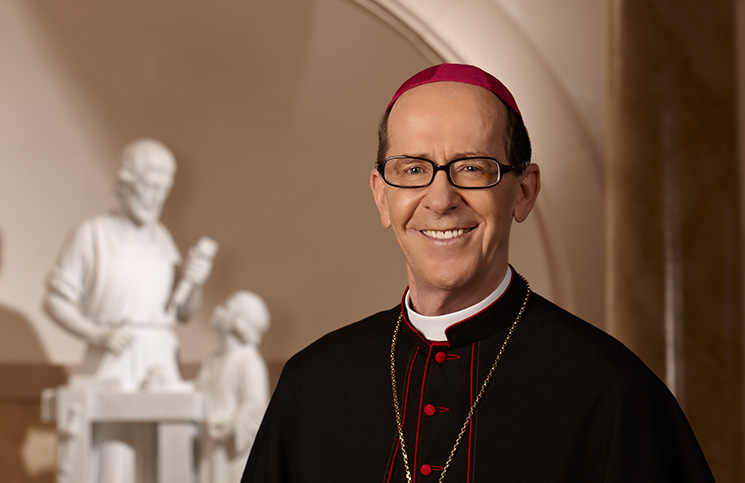This column, which originally appeared in the June 3, 2004 issue of The Catholic Sun, is the third in a series of three.
Since the universal call to holiness demands of all a share in the Cross of Christ, it is not surprising that persons with homosexual inclinations face difficulties of various sorts as they, like all other followers of Jesus, seek to love God with all their mind and heart, and to love their neighbor as themselves. These difficulties include the following four.
1) Intellectual confusion about whether sexual activity outside of marriage is always wrong.

In recent years, one sector of the popular culture has made a concerted effort to persuade public opinion that same sex relations (indeed all kinds of sexual relations outside of marriage) are normal and morally neutral (or even morally beneficial!). Whoever would challenge such assertions runs a high risk of being labeled as homophobic or some other derogatory term.
In fact, what has occurred in these cases is a rejection of an understanding of human sexuality found in most cultures and major religions of the world down through history, one found in both the Old and New Testaments, and one found in Catholic, Orthodox and Protestant Christian Tradition. According to the modernist view, a morality based on truth and on objective norms is being replaced by a “morality” based on desire. Feelings, not truth, become criteria for whether something is right or wrong.
However, a morality not built on objective norms will never stand the test of time nor does it serve well the men and women of our present age. Truth does not change to suit our tastes. Some things are always wrong, no matter the times, the circumstances, or people’s intentions.
It is not homophobia that leads followers of Christ to consider homosexual acts to be wrong, it is the word of God found in the Old and New Testaments and in more than 2000 years of the Church’s consistent moral teaching. A brief look at a few Scriptural texts makes this abundantly clear. For example, there are the commands of God contained in Leviticus (18:22 and 20:13) that point out the sinfulness of homosexual acts. And in the New Testament, St. Paul teaches the same in several places (e.g. I Cor 6:9-10, Romans 1: 18-32, and I Tim 1:10). The Catechism of the Catholic Church (#2357) summarizes our Christian tradition quite succinctly: “Basing itself on Sacred Scripture, which presents homosexual acts as acts of grave depravity, tradition has always declared that ‘homosexual acts are intrinsically disordered.’ They are contrary to the natural law. They close the sexual act to the gift of life. They do not proceed from the genuine affective and sexual complementarity. Under no circumstances can they be approved.”
2) Confused notions of what constitutes marriage also make it difficult for homosexual persons and others to make good judgments about love and responsibility. The present push to give “homosexual unions” equal legal status with marriage shows the prevalence of such confusion in popular culture.
But marriage can exist only between a man and a woman because only the union of male and female can express the sexual complementarity created and willed by God for marriage. In the marital embrace, husband and wife make a total gift of themselves to one another in their masculinity and femininity. They do so as persons with equal dignity but truly different as man and woman; as such, they are able to express sexual love as intended by God to build their communion as persons and to serve the transmission of new life.
For this reason, it is not unjust to deny legal status to “same-sex unions” because such unions are essentially different from marriage. Moreover, such a legal redefinition would harm the institution of marriage itself. As the U.S. bishops stated recently, “When marriage is redefined so as to make other relationships equivalent to it, the institution of marriage is devalued and further weakened. The weakening of this basic institution at all levels and by various forces has already exacted too high a social cost.”
3) Reductionist views of the personhood of those with homosexual inclinations present serious obstacles for them on their road to holiness. A certain fixation on one’s sexual orientation can occur such that the rich and complex nature of a person gets reduced to just one part of his or her identity, only the sexual orientation. This serves neither a person’s dignity nor inner freedom. Rather, it gives exaggerated emphasis to a single aspect of one’s identity while undercutting or obfuscating the other dimensions, some of which are far more important. For example, more important is our identity as sons and daughters of God, created in the divine image. More important is the privilege of being brothers and sisters in Christ. In addition, this reductionism can hinder one’s ability to see the human body as a temple of the Holy Spirit created by God for the fruits of chastity, joy and peace.
4) False views of human freedom assert that homosexual acts are not sinful for homosexual persons because of their sexual orientation. They assert instead that such acts are morally neutral or even morally beneficial. After all, the argument goes, a good God would not allow homosexual inclinations if they were ordered towards a sinful end.
But such argumentation reflects a false understanding of human nature and the way it has been wounded by original sin. In addition, it runs contrary to both love and truth. St. Paul talks about this struggle with sinful tendencies common to every human person (Romans 7:19-25), “For I do not do the good I want, but I do the evil I do not want… For I take delight in the law of God, in my inner self, but I see in my members another principle at war with the law of my mind, making me captive to the law of sin that dwells in my members. Miserable one that I am! Who will deliver me from this mortal body? Thanks be to God through Jesus Christ our Lord.”
Yes, the whole human race stands in need of a Redeemer. We all have temptations and sinful inclinations to oppose. We all need to be strengthened by grace in order to avoid what is wrong and to know the blessing of a chaste life. But that is precisely what we have in Christ. He gives us the grace to love in truth; He gives us the call and responsibility to do so. To excuse oneself of this freedom and responsibility is to take a road that spirals downward into ever-greater sadness and confusion. It is a road no one needs to take.
Rather, God calls us to the opposite road, the narrow road, the way of holiness, the way of the Cross, the way that leads to fullness of maturity in Christ.






![[VIDEO] Make Sunday feel like Sunday again](https://www.catholicsun.org/wp-content/uploads/2021/04/2021-YOUTUBE-BISHOP-MESSAGE-THUMBNAIL-ENGLISH-218x150.png)
